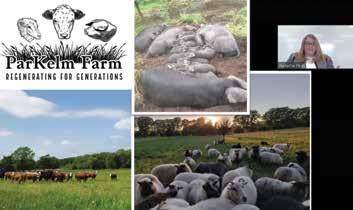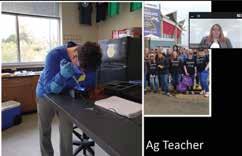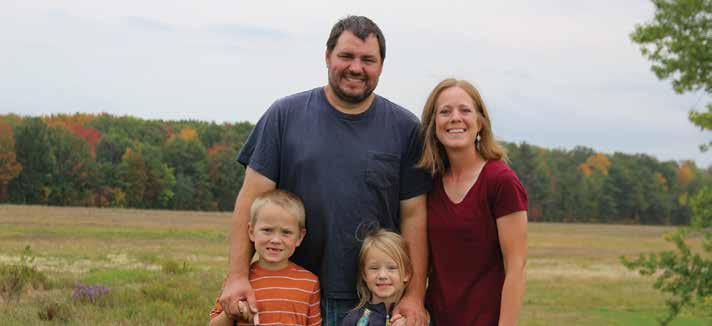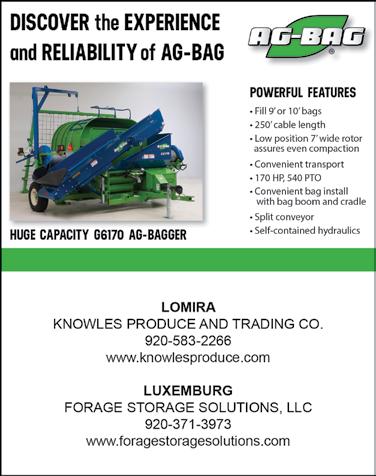
17 minute read
YFA MEMBERS SHINE
YFA Members Shine in National Light
Julie Sweney of Dodge County made it to the Sweet 16 Round of American Farm Bureau’s Young Farmers & Ranchers Discussion Meet.
Advertisement
The Discussion Meet contest is a panel discussion in which Farm Bureau members between the ages of 18 and 35 are judged on their ability to express their ideas and opinions and reach a solution on current issues affecting agriculture. The competition was held virtually this year.
Sweney grew up on her family’s dairy farm in Dodge County. She is a 2011 graduate of the WFBF Leadership Institute and serves on the Dodge County Farm Bureau board of directors as membership chair. She is the director of marketing and communications at FarmFirst Dairy Cooperative, serving dairy farmers throughout the Midwest.
Marquee Ricks of Idaho won the Discussion Meet. The runner-up in the Discussion Meet contest was Clarissa Cauthorn of Missouri. Garrett Love of Kansas won third place. The fourth-place finalist was Tyler Pittman of Florida.
Natasha Paris represented Wisconsin in AFBF's Young Farmers & Ranchers Excellence in Agriculture Award where she made the Top 10.
The Excellence in Agriculture Award is presented to a Farm Bureau member between the ages of 18 and 35 who is actively engaged in agriculture but derives the majority of his or her income from an off-farm agricultural career.
Paris is an agri-science teacher and FFA advisor at Ripon High School. She and her husband, Jordan, own ParKelm Farm, a pasture-based livestock farm. Paris has been a Farm Bureau member since 2015 and serves as the YFA chair and vice president of Green Lake County Farm Bureau.
Jackie Mundt of Kansas won the Excellence in Agriculture Award. The runners-up in the Excellence in Agriculture contest were Casey and Kelli Snider of Utah.
"While virtual, the overall experience was wonderful and I'm grateful for this unique opportunity. It certainly would have been great to have competed in person, but doing so virtually challenged competitors in a unique way that provided a more courteous type of discussion to take place. I also would suggest that the experience was less intimidating since the only people I was aware of were the other competitors and the room moderator. I have thoroughly enjoyed this as a virtual experience." - Julie Sweney "Competing at the national level, even virtually, was a surreal experience. To be showcased alongside so many others who have done so much for agriculture, and then to be named to the Top 10, was such an honor. While traveling is fun, I loved being able to watch it all from home and to get to meet my competitors during our downtime and rehearsals." - Natasha Paris


NEWS
Member Makes Final Four in Ag Innovation Challenge
Harvust was announced the winner of the seventh annual American Farm Bureau Ag Innovation Challenge, becoming the 2021 Farm Bureau Entrepreneur of the Year. AFBF, in partnership with Farm Credit, announced the winner at AFBF’s Virtual Annual Convention.
Walla Walla, Washington-based Harvust’s software platform helps farmers successfully hire, train and communicate with employees. The company received a total of $50,000 in prize money to help grow the business. The Harvust team is led by Riley Clubb, a Washington Farm Bureau member. Agro Empresas Black Belt of Coamo, Puerto Rico, won the People’s Choice Award, which is decided by public vote, and received a total of $20,000. Luis Raimundo Bures Martinez, a Puerto Rico Farm Bureau member, is team lead for the company, which standardizes methods and processes for hydroponic crop production. Arbré Technologies, Inc., of Wisconsin, led by Matthieu Vollmer, a Wisconsin Farm Bureau member; and TerraClear Inc. of Idaho, led by Trevor Thompson, an Idaho Farm Bureau member, were the other two finalist teams that competed in the final round of the competition. The final four teams were selected on Jan. 8, from 10 semifinalist business owners who presented to a panel of six industry judges. Each of the 10 semi-finalists was awarded $7,500 and the final four teams were awarded a total of $15,000 each.
“Innovation is at the heart of what we do as farmers and ranchers, and these Challenge finalists have created a wide array of solutions to help us continue to grow plentiful, healthy food, fuel and fiber,” said AFBF President Zippy Duvall. “I look forward to seeing these companies continue to grow as their products and services are utilized on farms and ranches across the country.”
The Challenge provides opportunities for Farm Bureau members to showcase business innovations being developed for agriculture. The Entrepreneur of the Year was selected by a four-person judging panel: Jamie Johansson, president, California Farm Bureau Federation; Nick Wijnberg, vice president – food and agribusiness, Farm Credit; Tom Schryver, executive director of the Center for Regional Economic Advancement, Cornell University; and Taya Spelhaug, TechSpark manager – North Dakota, Microsoft. Farm Bureau is proud to recognize these businesses, in partnership with sponsors Farm Credit, Bayer Crop Science, Farm Bureau Bank, Farm Bureau Financial Services, FMC Corporation and John Deere.

Members to Serve on AFBF Issue Advisory Committees
Four Wisconsin Farm Bureau Federation members have been named to American Farm Bureau’s Issue Advisory Committees. Due to COVID-19 restrictions, the 13 committees will meet virtually in February.
AFBF’s Issue Advisory Committees provide an avenue for Farm Bureau’s grassroots leaders to contribute their issue expertise to the organization’s policy deliberations.
Outcomes of the committees’ deliberations include advice and counsel to the AFBF Board of Directors on policy-related actions AFBF might be advised to take, recommendations for state Farm Bureau policy development and policy recommendations to the AFBF Resolutions Committee.
Peter Kimball of Baldwin was selected to serve a two-year term on the water committee. This committee covers Clean Water Act issues, national and regional water storage programs, U.S. Army Corps of Engineers water-related efforts and flood control. Kimball is a dairy farmer and a WFBF Board member.
Dave Daniels of Union Grove continues to serve his two-year term on the farm policy committee. This committee discusses risk management, crop insurance, price and income support programs and conservation programs. Daniels is a dairy farmer and WFBF’s Vice President.
Don Radtke of Merrill continues to serve on the agricultural labor committee. Radtke and his fellow committee members will explore topics like guest worker Kimball Radtke programs, Occupational Safety and Health Administration regulations, employment taxes and health care. Radtke is a Marathon County Farm Bureau leader and Daniels Nigh former WFBF Board member.
Robert Nigh of Viroqua also continues to serve his twoyear term on the animal care committee. This committee will examine current animal care and animal health standards, antibiotic use and livestock processing. Nigh is a dairy farmer and is a WFBF Board member.

NEWS
Farm Bureau Supports Communities During COVID-19
As the impacts of the COVID-19 pandemic brought money to donate to healthcare workers affected by COVID-19. economic hardship to rural communities and food banks From the beginning of the COVID-19 pandemic in March struggled to keep up with increased demand, state and county 2020 when consumers began to see empty grocery store Farm Bureaus donated millions of dollars and pounds of food shelves, the AFBF’s #StillFarming social media campaign to help those in need of assistance. built public confidence in farmers’ and ranchers’ ability to
Through its network of state and county Farm Bureaus across produce food and reassured consumers of the strength of the the country, Farm Bureau responded to the call, giving $5.4 U.S. food supply. Building on this initiative, AFBF launched million and 1.4 million pounds of food to local food banks, food a #StillFarming line of merchandise, with half of the proceeds pantries and pandemic relief programs. benefiting Feeding America and half “Farm Bureau has always stepped Farm Bureau gave $5.4 million benefiting the American Farm Bureau up to help our communities, especially and 1.4 million pounds of food Foundation for Agriculture, to give back in times of disaster and crisis, and this was no exception,” said American Farm Bureau Federation President to local food banks, food pantries and pandemic relief programs. to the communities that trusted farmers to feed their families throughout this difficult time. Zippy Duvall. “Throughout the pandemic, Farm Bureau has All of this work was accomplished as Farm Bureaus across been there, supporting farmers and ranchers, giving back to the country also focused intently on ensuring farmers and communities, providing assurance that our food supply is strong ranchers had the support and resources they needed to continue and ensuring America’s pantries are stocked. I’m so proud of the operating and to ensure the integrity of the food supply chain. countless acts of kindness and compassion by our Farm Bureau At the national level, this included rapid action to ensure family who gave their time and resources to make life a little farm employees were deemed essential; modifications to better for their neighbors.” immigration rules to follow safety protocols while ensuring Farm Bureau donations came in all shapes and sizes, ranging access to farm employees; many consultations with members from an individual farm donating a dozen pounds of cheese to of Congress, the administration and federal agencies to deliver county Farm Bureaus donating hundreds of dollars or pounds two Coronavirus Food Assistance Programs and other aid of food to state Farm Bureaus contributing six-figure monetary totaling $36 billion to offset pandemic-related losses; inclusion donations. of agriculture in the Small Business Administration’s Paycheck State and county Farm Bureaus reached out to serve their Protection Program and Economic Injury Disaster Loan local communities in many ways beyond monetary and food program; and advocating for action to assist meat processing donations. Staff and volunteers gave thousands of hours, plants in safely operating to avoid a further crisis for livestock coordinating logistics for food distribution programs, delivering producers and to protect the meat supply for U.S. consumers. groceries, donating and distributing thousands of gallons AFBF’s commitment to ensuring farmers and ranchers thrive of hand sanitizer, distributing millions of masks and other in the face of pandemic-related challenges and natural disasters protective equipment and donating and delivering meals to is part of fulfilling our mission to build a sustainable future of seniors and healthcare workers. Farm Bureaus also organized safe and abundant food, fiber and renewable fuel for our nation community fundraisers for relief efforts, including raising and the world.
Wisconsin Farm Bureau and Rural Mutual Give Back
Wisconsin was counted in the Farm Bureau gives back program for its work on the Wisconsin Food and Farm Support Fund.
In partnership with Rural Mutual Insurance Company, Wisconsin Farm Bureau is proud to support the Wisconsin Food and Farm Support Fund to benefit the state’s farmers and help feed residents in need. The Wisconsin Food and Farm Support Fund provides support to our state’s farmers and encourage consumption of milk and other agriculture products to ensure farmers continue to have a place to sell their products, and provide Wisconsinites access to nutritious, highquality foods.
As part of this fundraising effort, Wisconsin Farm Bureau is collecting monetary donations for Harvest of Hope while Rural Mutual Insurance Company is raising funds for Feeding Wisconsin. Collectively the fund will reach all corners of our state from the most urban areas to the rural farming communities.
You can learn more about this initiative by visiting wfbf.com/ wisconsin-food-and-farm-support-fund.

Farm Bureau Partners with Feeding America on #StillFarming Campaign
The American Farm Bureau Federation launched a new effort to address food insecurity while celebrating the strength of the U.S. food supply and commitment of America’s farmers and ranchers to keep it strong. The #StillFarming campaign, which began on social media, is now expanding to a merchandise line that will benefit food banks and agricultural education.
The COVID-19 pandemic shutdowns in March 2020 caused disruptions to the food supply chain, resulting in empty grocery shelves in parts of the country. When alarmed Americans resorted to panic purchasing, AFBF created the #StillFarming social media campaign to build public confidence in farmers’ and ranchers’ ability to produce food and reassure consumers of the strength of the U.S. food supply. #StillFarming has reached nearly 100 million people across the digital landscape, building confidence in the U.S. food supply and trust in farmers and ranchers by sharing the challenges they are overcoming to feed America and the world.
Building on its popularity and recognizing the dramatic increase in hunger in America brought on by the pandemic, AFBF created #StillFarming to Feed America T-shirts and committed to donating all profits. Half will be donated to Feeding America, the country’s largest hunger-relief organization, and half of the profits will go to the American Farm Bureau Foundation for Agriculture.
“Despite all the uncertainty brought on by the pandemic, there’s never been a question that America’s farmers and ranchers would continue supplying healthy, affordable food and it was important for us to assure the public of that,” said AFBF President Zippy Duvall. “The success of #StillFarming is a credit to Farm Bureau members across the country who took it and ran with it. It has been inspiring to see their stories from across the country and I’m pleased to build on the campaign to help address hunger through our partnership with Feeding America.”
AFBF first partnered with Feeding America in April, coauthoring a letter to USDA calling for a federal program to help deliver farm-fresh products to food banks facing unprecedented demand. At the time, many farmers had no destination for their products due to restaurant and food service closures. The letter and subsequent meetings with USDA contributed to the formation of the Farmers to Families Food Box Program.
The new partnership between AFBF and Feeding America also builds on a long history of partnerships between county and state Farm Bureaus and Feeding America’s local and regional food banks. Since the pandemic began, state and county Farm Bureaus across the country have donated $5.4 million and 1.4 million pounds of food to local food banks, food pantries and pandemic relief programs. According to Feeding America, 1 in 9 Americans is affected by hunger in the pandemic. This includes 2.2 million rural households.
“COVID-19 presented a perfect storm of increased demand, declines in food donations and overall disruptions to the charitable food system. Food banks across the country are working hard to support their neighbors in need,” said Katie Fitzgerald, Executive Vice President and Chief Operating Officer at Feeding America. “We are grateful to AFBF for their commitment to fighting hunger and for providing everyone with the opportunity to give back.” The pandemic also increased consumer curiosity about how food is produced. Giving the public a window into agriculture and how food is grown is part of the mission of the American Farm Bureau Foundation for Agriculture. Recognizing that #StillFarming helped tell agriculture’s story, it’s fitting that profits from #StillFarming to Feed America T-shirts will further that cause. “The Foundation is honored to be a partner with AFBF on this program,” AFB Foundation Executive Director Daniel Meloy said. “Funds received through the #StillFarming T-shirts will help us continue to reach kids all across America and help educate them on where their food comes from.” The T-shirts are being sold through AFBF’s online shop at FB.org/StillFarming and will be available through June.

NEWS
New Report Recommends Improvements to NASS
Anew report released by the American Farm Bureau
Federation provides an in-depth examination into the U.S. Department of Agriculture-National Agricultural Statistics Service’s survey collection and data reporting issues. It also provides recommendations to improve accuracy and farmer confidence in the survey results.
The USDA-NASS Working Group, comprised of 10 farmer members, spent more than four months evaluating the process and methodologies USDA-NASS uses to put farmer survey data into monthly reports.
“While NASS may have a gold standard reputation for agriculture statistics globally, U.S. farmers’ confidence in their reports has unfortunately declined,” said AFBF President Zippy Duvall. “Large changes, especially the last two years due to adverse weather events, in estimates of planted area, crop yields and inventory levels have caused wild swings in markets and left farmers questioning the agency’s ability to respond quickly to rapidly changing conditions on the ground. We hope the work done by this group will provide a framework for USDA to make timelier adjustments to these key reports and restore trust in the data we’ve relied upon for so long. NASS has been responsive to feedback in the past and we are committed to working with the agency to achieve these new goals.”
Key recommendations of the report include:
Increase transparency with the agricultural community
NASS should help farmers understand how the agency arrives at the numbers reported and provide clarity on the relationship between aggregate, state, county and field-level reported numbers. If the numbers are not the most current due to a market event that occurred after the data collection period, NASS should note that. NASS should also make a special note when major revisions are made to previously reported estimates.
Accelerate new and innovative technology adoption
At a time when faster computers, speedier algorithms and access to better data and proprietary models give agricultural industry stakeholders, traders and the investment community a competitive advantage in commodity market analysis, NASS should have the best resources, information, data, software, hardware, talent and networks so that it can accelerate the development of innovative and more timely survey instruments and analysis for the benefit of the agricultural community.
Increase collaboration with Farm Bureau to accomplish shared goals
Farm Bureau is committed to being a partner for NASS in a variety of ways, including working to encourage farmers’ accurate and timely participation in NASS’ data collection efforts, encouraging lawmakers to provide NASS the funding it needs to upgrade its technology and hire and retain top-notch staff, participating in NASS advisory groups and continuing to consistently attend NASS data user meetings.
Strengthen NASS for U.S. agriculture
The implementation of the above recommendations will go a long way toward improving the great work already being done by NASS and strengthen the agency’s position as a reliable collector and distiller of agricultural data, which will benefit farmers, ranchers and the industry as a whole.

Know a Wisconsin farmer or forester who goes above and beyond in the care and management of natural resources? Nominate them for the 2021 Wisconsin Leopold Conservation Award®. Sand County Foundation presents the Leopold Conservation Award to private landowners in 20 states for extraordinary achievement in voluntary conservation. In Wisconsin the $10,000 award is presented annually with Wisconsin Farm Bureau Federation, Dairy Farmers of Wisconsin and Wisconsin
Land and Water Conservation Association.
Given in honor of renowned conservationist Aldo Leopold, the award recognizes landowners who inspire others with their dedication to land, water and wildlife habitat management on private, working land. In his influential 1949 book, “A Sand County Almanac,” Leopold called for an ethical relationship between people and the land they own and manage.
Nominations may be submitted on behalf of a landowner, or landowners may nominate themselves. The application can be found at sandcountyfoundation.org/ApplyLCA.
The application deadline date is Aug. 5, 2021. Applications can be emailed to award@sandcountyfoundation.org. If mailed, applications must be postmarked by Aug. 5, and mailed to:
Leopold Conservation Award c/o Sand County Foundation 131 W. Wilson Street, Suite 610
Madison, WI 53703
Applications are reviewed by an independent panel of agricultural and conservation leaders.
“Recipients of this award are real life examples of conservation-minded agriculture,” said Sand County Foundation President and Chief Executive Officer Kevin McAleese. “These hard-working families are essential to our environment, food system and rural economy.” The Leopold Conservation Award Program in Wisconsin is made possible thanks to the generous support of American Farmland Trust, Dairy Farmers of Wisconsin, Wisconsin Farm Bureau Federation, Sand County Foundation, Compeer Financial, Culver’s, McDonald’s, USDA Natural Resources Conservation Service, We Energies Foundation, Wisconsin Corn Growers Association, Wisconsin Corn Promotion Board, Wisconsin Land and Water Conservation Association and Wisconsin Potato and Vegetable Growers Association.
The Leopold Conservation Award will be presented at the Wisconsin Farm Bureau Federation’s Annual Meeting in December.
The first Wisconsin Leopold Conservation Award recipient was selected in 2006. John and Melissa Eron of Stevens Point received the award in 2020.
“A commitment to conservation is truly worth recognizing and celebrating. I encourage farmers to apply or nominate someone who deserves this special recognition for their continued conservation efforts.” - Wisconsin Farm Bureau President Kevin Krentz
John and Melissa Eron, 2020 Leopold Conservation Award winners.













